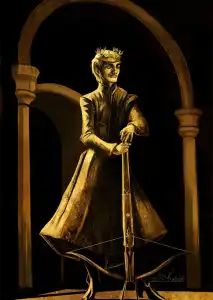Chapter 428: Instructing the Heir |
With the conclusion of the London Conference, the European continent finally welcomed a brief period of peace. Those who have never experienced war will never know its horrors.
As the victor of this war, William I did not show much joy. In terms of territory, the Kingdom of Prussia now is almost the same as the German Empire in the original timeline, and its total population has surpassed the 20 million mark.
These gains cannot hide the fact that the military has grown too powerful. Without Bismarck, the government can no longer keep the military in check.
The balance of power has been broken, which is not good for the emperor. William I, being politically astute, did not play any tricks like “removing the ladder after climbing up” or “cooking the hound once the hares are bagged.”
In the Berlin Palace, William I announced a new appointment, “Prime Minister Franck has resigned due to health reasons, and now Marshal Moltke will take over.”
If suppression doesn’t work, then divide and conquer. Moltke is great at military strategy but far less skilled in politics. Putting him in the position of prime minister is essentially setting him up for failure.
No matter how high his current prestige, if he makes mistakes later, he will still be brought down, and the prestige gained from the war will be lost.
In most countries, it is impossible for a military marshal to become prime minister. The line between civil and military roles would prevent this. However, in the Kingdom of Prussia, it is entirely normal for military leaders to serve as prime ministers.
William I’s strategy is open and transparent; with a change in position comes a change in perspective. Unless Moltke is willing to be a mere figurehead, he will eventually act to restrain the military.
...
Compared to the relatively harmonious power struggles in the Kingdom of Prussia, the situation in the neighboring Russian Empire is completely different. After the treaty was signed, the Tsar’s army began rounding up people everywhere.
The reckoning had finally come. During these days, Alexander II had not been idle and had thoroughly investigated the situation. He had been holding back from taking action, waiting for the right moment to settle accounts.
For a time, the prisons in St. Petersburg were overcrowded. A large number of corrupt officials were caught, causing widespread panic among the bureaucrats.
If the investigation were strictly followed, every single bureaucrat in the Russian government could be arrested.
Even those who haven’t committed crimes yet are on the path to committing them. The word “wronged” is unneeded as the Russian government’s bureaucratic system is thoroughly rotten.
Alexander II is not a naive idealist and knows that it is unrealistic to eliminate all the bureaucrats.
Those being arrested now are the main culprits responsible for the defeat in the war. Someone has to be held accountable for the loss, and since Alexander II did not intend to find scapegoats, it fell to these officials to take the blame.
In the Winter Palace, watching the continuous capture of criminals, Alexander II was troubled. Most of these people were nobles, and according to tradition, they could not be executed.
Often, the problems were not entirely the fault of the senior officials. If they took a portion, their subordinates took three portions, with these layers of embezzlement leading to the great defeat.
Some inconspicuous lower-level government employees embezzled more than the senior officials. The lower the level, the more corrupt they were, while those at the top had to consider the consequences.
Executing all of them was unrealistic. These minor corrupt officials were not ordinary people; they were at least middle class. Executing them all would have a terrible social impact.
Moreover, killing these people wouldn’t solve much; it wouldn’t change the deeply corrupt bureaucracy of the Russian Empire.
Finance Minister Reutern suggested, “Your Majesty, let’s exile them! We need to use political means to dismantle the rebel forces, and now is not the time for a massacre.”
This was the most helpless yet effective solution for the Russian government. However, due to poor oversight later on, these exiled individuals came back and overthrew the Russian government.
The existence of the rebel forces saved these scoundrels. To ensure the rebels would surrender confidently, Alexander II had to pretend to be merciful.
Rebellion is different from embezzlement; it endangers the nobles’ lives. No matter how high their status, if they participated in rebellion, they could be executed.
After some hesitation, Alexander II decided, “First, recover all the embezzled funds, then exile these bastards to the most inhospitable regions of Siberia.”
Exile required some finesse. Most of Siberia had a harsh icy climate, but that didn’t mean there were no decent places.
For example, the conditions in Novosibirsk were relatively better, although it was still just a small town at the time.
On the other hand, Oymyakon was an extreme case, with winter temperatures typically reaching -71 degrees Celsius and even having recorded a low of -96.2 degrees Celsius, effectively turning people into icicles.
Clearly, Alexander II was deeply resentful of these people and planned to freeze them to death.
...
While Alexander II was cleaning out the corrupt officials, the struggle for the Polish throne was intensifying, spreading across the entire European continent and even affecting the Austrian court.
Poland is a major country with a glorious past. Many people are interested in this crown, including several members of House Habsburg, notably two of Franz’s brothers.
Franz quickly suppressed such undesirable ambitions. He provided a simple reason: “Do you want to become the king of a doomed nation?”
This immediately brought everyone to their senses, reminding them of the dire situation of the Kingdom of Poland. There had been three partitions of Poland in the last century; would it not happen again?
The idea of a Polish-Prussian alliance was also a joke. Once the Russian Empire recovers, there will inevitably be a conflict between them.
Few people believe that the Polish-Prussian alliance can win, as it’s not possible to find so many allies for every war.
In this recent Eastern European war, if it weren’t for the British pulling the strings from behind, not only would Poland not have gained independence, but the Kingdom of Prussia might also have become history.
Will they be so lucky in the next war? If they lose, Poland will be doomed.
Everyone’s enthusiasm was immediately dampened. Maximilian’s negative example was still fresh. He did not listen to advice and went on to become the Emperor of Mexico, and everyone knew the kind of life he was leading now.
If one day Maximilian were suddenly overthrown, no one would be surprised. Being a negative example, a good outcome was naturally not expected.
After calming the internal situation, Franz ignored the external disputes. No matter who becomes the King of Poland, they will inherit a mess and won’t be able to lead Poland to rise.
Just look at the map: to the east is the Russian Empire, to the southwest is Austria, and to the north is the Kingdom of Prussia. The three countries effectively encircle Poland.
Merging with the Kingdom of Prussia to form a federal empire is actually their best option. However, the proud Poles cannot accept this, and besides, this path is not easy.
Secondly, they could stubbornly resist the Russian Empire, pushing through the Ukrainian region to occupy the fertile black soil and establish a strong foundation.
This is almost like a dream. Franz does not believe the Poles can achieve this. It would require not only military victory but also superior political and diplomatic skills.
The last resort is to seek a powerful ally. The Russian Empire is destined to be their enemy, so there is nothing to discuss there. For Poland to protect itself, it must maintain good relations with other European countries.
The relationships with their two neighbors, Prussia and Austria, are particularly crucial. Only by handling these relationships well can Poland have a chance of survival.
Following the principle that political education should start from a young age, the Polish question became a real-life case study for Franz’s children. The main focus was on teaching his eldest son, Frederick, since the other three were still too young.
The youngest, George, was born in 1865 and is only two years old, so politics is still far from his concern.
In fact, Frederick is also quite young, only 11 years old now. If he were from an ordinary family, he would still just be a primary school student.
Franz wasn’t sure whether Frederick could handle learning politics at such a young age. But he had no choice but to teach him, fearing that someone might lead him astray, like his second brother Maximilian, who became an idealist and ended up in a mess.
“Frederick, let me test you. If you were the King of Poland, what would you do now?”
Facing this tricky question, Frederick gave an answer that Franz did not expect.
“Can I just not do it?”
Seeing Franz’s lack of reaction, Frederick added, “I mean, abdicate!”
Franz neither opposed nor agreed, but asked, “What’s your reason?”
Frederick shook his little head and said, “I don’t know what a Polish king is supposed to do or what he can do! Given that, it’s better to just let go.”
This was also an answer, at least one that preserved himself. Franz smiled slightly and said nothing.
To take action, one must first preserve oneself. This was a principle Franz had instilled in them from a young age. How effective it would be, he wasn’t sure, but for now, they could resist temptation because they had not yet touched power.
Many people pursue the impossible out of idealism, which can be commendable. But in a royal family, it is a disaster.
Franz continued to ask, “What if you were the King of Prussia instead? Would you continue to let go?”
The situation in the Kingdom of Prussia is much better than in Poland. After defeating the Russians, William I is at the height of his power, with a public support rating of at least 90 out of 100.
Frederick thought for a moment and said, “Instead of seeking expansion, we should develop the domestic economy. Prussia gained too much from this war, and it needed to digest these gains.
It must be done quickly before the Russian Empire recovers, to have a chance of winning a second Prusso-Russian war.”
Franz smiled and said, “Not bad, at least you understand the need to strive and not retreat at the first sign of trouble. But that’s not enough.
While developing yourself is important, striking at your enemies is equally crucial. Keep an eye on William I’s actions. He definitely won’t sit by and watch the Russians regain their strength.
You might even get to see a Prussia-Poland union. Of course, this will depend on William I’s political maneuvers.”
Frederick shook his little head, full of confusion. A Prussia-Poland union? What kind of operation is that?
Isn’t everyone against the merging of Prussia and Poland? Why does the Kingdom of Prussia have to merge with Poland? Not only did all the European countries oppose it, but even the Polish people opposed it. Would such a union be useful?
Franz did not continue to explain. He believed that observing and figuring things out on one’s own was far more effective than being directly told.
Using international situations as textbooks and the monarchs of various countries as case studies was Franz’s method of teaching his son.
Whether as positive examples or negative ones, personally experiencing these situations leaves the deepest impression.
Learn from their strengths, summarize their weaknesses, and draw lessons from them. This was not only a way to teach his son but also a form of self-learning for Franz.

















